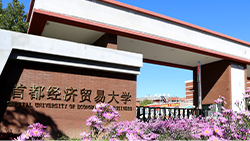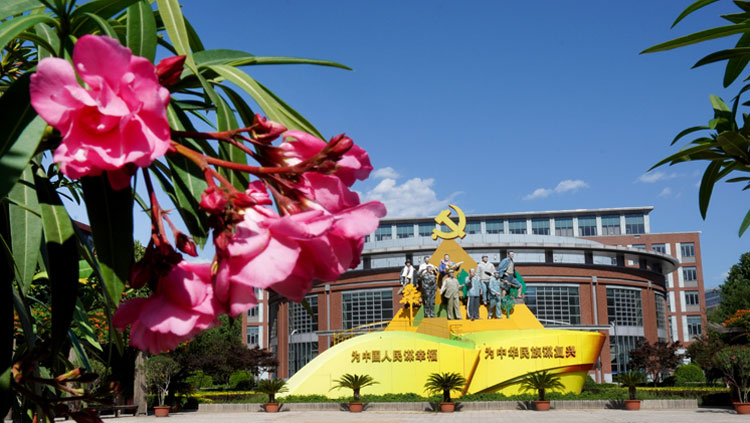教育背景:
2010年获中国人民大学经济学学士、理学学士
2012年获中国人民大学经济学硕士
2013年获京都大学经济学硕士
2016年获京都大学经济学博士
研究领域:
应用微观计量;企业经济;环境经济
讲授课程:
本科生:微观经济学;宏观经济学;中级微观经济学
研究生:中级微观经济学
博士生:高级微观经济学(全英文)
学术论文:
Zhang, D. (2024). From ban to balance: How agricultural climate policies reshape rural asset allocation? Journal of International Money and Finance, 149, 103205.
Zhang, D., Wang, C., He, Y., & Vigne, S. A. (2024). Does FinTech efficiently hamper manipulating ESG data behavior?. The British Accounting Review, 101494.
Zhang, D., Bai, D., & Wang, Y. (2024). Green vs. brown: Climate risk showdown - who’s thriving, who’s diving?. Journal of International Money and Finance, 103198.
Zhang, D., Zhao, M., Wang, Y., Vigne, S. A., & Benkraiem, R. (2024). Technological innovation and its influence on energy risk management: Unpacking China’s energy consumption structure optimization amidst climate change. Energy Economics, 131, 107321.
Zhang, D. (2024). The pathway to curb greenwashing in sustainable growth: The role of artificial intelligence. Energy Economics, 133, 107562.
Zhang, D. (2023). Can digital finance empowerment reduce extreme ESG hypocrisy resistance to improve green innovation?. Energy Economics, 125, 106756.
Zhang, D. (2023). Can environmental monitoring power transition curb corporate greenwashing behavior? Journal of Economic Behavior & Organization, 212, 199-218.
Zhang, D. (2023). Does green finance really inhibit extreme hypocritical ESG risk? A greenwashing perspective exploration. Energy Economics, 121, 106688.
Zhang, D. (2023). Subsidy expiration and greenwashing decision: Is there a role of bankruptcy risk?. Energy Economics, 118, 106530.
Hossain, A., Rjiba, H., & Zhang, D. (2023). Ex-ante litigation risk and firm-level climate-change exposure. Journal of Economic Behavior & Organization, 214, 731-746.
Zhang, D., Kong, Q., Wang, Y., & Vigne, S. A. (2023). Exquisite workmanship through net-zero emissions? The effects of carbon emission trading policy on firms’ export product quality. Energy Economics, 123, 106701.
Zhang, D., Kong, Q., & Shen, M. (2023). Does polycentric spatial structure narrow the urban-rural income gap? Evidence from six urban clusters in China. China Economic Review, 80, 101999.
Zhang, D. (2022). Are firms motivated to greenwash by financial constraints? Evidence from global firms’ data. Journal of International Financial Management & Accounting, 33(3), 459-479.
Zhang, D. (2022). Do heterogenous subsides work differently on environmental innovation? A mechanism exploration approach. Energy Economics, 114, 106233.
Zhang, D. (2022). Does the green loan policy boost greener production? Evidence from Chinese firms. Emerging Markets Review, 51, 100882.
Zhang, D. (2022). Environmental regulation and firm product quality improvement: How does the greenwashing response? International Review of Financial Analysis, 80, 102058.
Zhang, D. (2022). Environmental regulation, green innovation, and export product quality: What is the role of greenwashing? International Review of Financial Analysis, 83, 102311.
Zhang, D., & Kong, Q. (2022). Green energy transition and sustainable development of energy firms: An assessment of renewable energy policy. Energy Economics, 111, 106060.
Zhang, D. (2022). Green financial system regulation shock and greenwashing behaviors: Evidence from Chinese firms. Energy Economics, 111, 106064.
Zhang, D., & Kong, Q. (2022). Credit policy, uncertainty, and firm R&D investment: A quasi-natural experiment based on the Green Credit Guidelines. Pacific-Basin Finance Journal, 73, 101751.
Zhang, D., & Kong, Q. (2022). Do energy policies bring about corporate overinvestment? Empirical evidence from Chinese listed companies. Energy Economics, 105, 105718.
Zhang, D., & Kong, Q. (2021). How does energy policy affect firms’ outward foreign direct investment: An explanation based on investment motivation and firms’ performance. Energy Policy, 158, 112548.
Zhang, D. (2021). Corporate innovativeness and risk management of small firms - evidences from start-ups. Finance Research Letters, 42, 102374.
Zhang, D. (2021). Green credit regulation, induced R&D and green productivity: Revisiting the Porter Hypothesis. International Review of Financial Analysis, 75, 101723.
Zhang, D. (2021). Is export tax rebate a quality signal to determine firms’ capital structure? A financial intermediation perspective. Research in International Business and Finance, 55, 101317.
Zhang, D. (2021). Marketization, environmental regulation, and eco-friendly productivity: A Malmquist-Luenberger index for pollution emissions of large Chinese firms. Journal of Asian Economics, 76, 101342.
Zhang, D., & Vigne, S. A. (2021). The causal effect on firm performance of China’s financing-pollution emission reduction policy: Firm-level evidence. Journal of Environmental Management, 279, 111609.
Zhang, D., Zhuge, L., & Freeman, R. B. (2020). Firm dynamics of hi-tech start-ups: Does innovation matter? China Economic Review, 59, 101370.
Zhang, D. (2020). Do credit squeezes influence firm survival? An empirical investigation of China. Economic Systems, 44(3), 100790.
Zhang, D. (2020). How do firms overcome financial constraint anxiety to survive in the market? Evidence from large manufacturing data. International Review of Financial Analysis, 70, 101503.
Zhang, D. (2020). Innovation dynamics -what are the housing market uncertainty’s impacts. International Review of Economics & Finance, 70, 413-422.
Zhang, D. (2019). Can export tax rebate alleviate financial constraint to increase firm productivity? Evidence from China. International Review of Economics & Finance, 64, 529-540.
Zhang, D., & Guo, Y. (2019). Financing R&D in Chinese private firms: Business associations or political connection? Economic Modelling, 79, 247-261.
Zhang, D., & Zheng, W. (2019). Less financial constraints, more clean production? New evidence from China. Economics Letters, 175, 80-83.
Zhang, D., Zheng, W., & Ning, L. (2018). Does innovation facilitate firm survival? Evidence from Chinese high-tech firms. Economic Modelling, 75, 458-468.
Zhang, D., & Liu, D. (2017). Determinants of the capital structure of Chinese non-listed enterprises: Is TFP efficient? Economic Systems, 41(2), 179-202.
张冬洋, 张羽瑶, 金岳. 税收负担、环境分权与企业绿色创新. 财政研究, 2021, 09, 102-112.
张冬洋. 环境政策如何影响中国企业升级?——来自“两控区”政策的准自然实验. 产业经济研究, 2020, 05, 73-85.
张冬洋. 融资约束视角下的运营资本对中国企业全要素生产率的贡献. 经济理论与经济管理, 2018, 3, 72-84.
专著:
Zhang, D.《The Relationship between Financial Intermediations and Firm Performance: An Empirical Study on Financial Constraints of Chinese Firms》, 晃洋書房(日本)出版社.
科研项目:
国家自然科学基金青年项目:环境规制、漂绿行为与绿色蜕变期企业产品质量——基于演化经济学视角,2021,主持
教育部人文社会科学基金青年项目:中国企业生存机制路径探寻及政策分析研究,2018,主持
北京社会科学基金青年项目:北京市金融消费环境风险评估的量化研究,2017,主持
“十四五”时期北京市属高等学校优秀青年人才培育计划:环境规制、绿色偏向型技术进步与创新型多中心城市群高质量发展研究,2022,主持
北京市高层次留学人才回国资助项目:中国企业漂绿指数刻画及企业漂绿成因的机制研究,2021,主持







